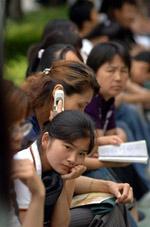Beijing hosted China’s first “Forum on Think Tanks” and selected the “Top Ten Think Tanks of China.” However, articles published in Beijing’s newspapers criticized that China’s think tanks cannot march to the beat of a different drum, and the public has no freedom to voice their opinions in authorities’ decision-making.
Overseas Boxun.net wired an article published in Beijing’s Common Folks journal, which states that, in the framework of modern countries, official research organizations are the inner brains of the bureaucratic system, while unofficial research think tanks are the essential outer brains of the country’s development. As soon as the outer think tanks submit to act as the official inner brain’s“servant” or “announcer,” agrees to only singing praises and talking big without doing anything, it cannot serve its function as it should. In China, these so-called think tanks can rarely express anything contrary to the opinions of the authorities.
Hu Ping, editor-in-chief of the Chinese language politics journal, Beijing’s Spring , headquartered in New York, said:
“It is completely inaccurate to even call these organizations in China ‘Think Tanks.’ It is in fact not a think tank at all, just like the Chinese Communist Party is not a party at all in the normal sense. It calls itself the party-in-power, but since there is no incumbent party, what sense does it make to call itself the ”party-in-power?” It is actually a despotic group, a completely different party concept than that in our normal sense.
Similarly, the think tank that we talk about is an organization that exists in a free and open world that raises all kinds of considerations and plans for the current society and government’s policy. In China, there isn’t such an independent organization at all. Therefore, in this sense, China doesn’t even have think tanks in the original sense.”
The Common Folks article suggests that these think tanks should experience the following things: see a doctor in the hospital, pay for some tuition in college, buy an apartment in a big city, live the countryside for a month, and work in a coal mine for a week.
The article holds that China has huge think tanks but they lack good development. Think tanks should embody the combined wisdom of the 1.3 billion Chinese people. Speaking of the elements that restrict think tanks’ development, Deng Xiaogang, professor of School of Sociology at Boston College said:
“In China, political power is extremely important. When you have the power, you have the funds, and then you have the projects; therefore these are all closely connected. From the angle of independence, I feel these scholars and think tank organizations have a certain degree of independence; however, I don’t think they have as much as to dare express an opinion different from that of the current policy or authorities.”
The top ten think tank selected during the first “Forum on China’s Think tanks” include, Chinese Academy of Social Sciences, The State Council R&D Center, Chinese Academy of Sciences, Military Academy of Science, Chinese International Affairs Research Institute, Chinese Modern International Relations Research Institute, Chinese Pacific Ocean Economic Cooperation National Committee, China Association for Science and Technology, Chinese Academic Society of International Strategy, and Shanghai International Affairs Research Institute. Out of these selected, the Chinese State Council appoints the persons in charge of the Chinese Academy of Social Sciences, Chinese Academy of Sciences, and State Council R&D Center. Also, the Military Academy of Science is the highest school of the Chinese military.



